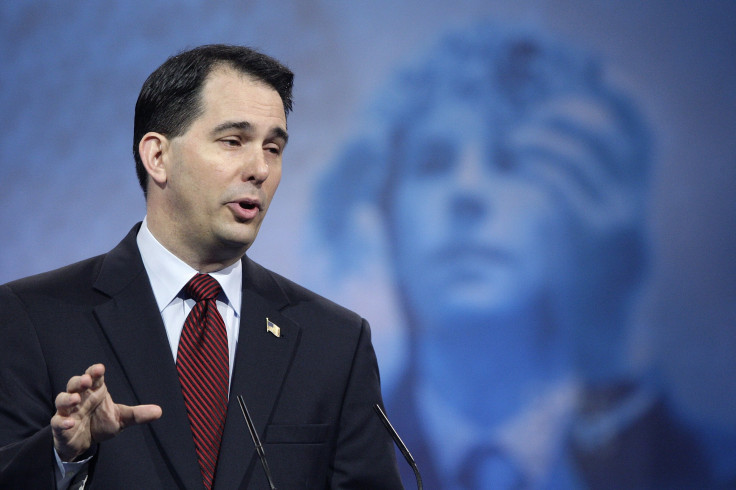Scott Walker 2016: Does Not Having A College Degree Damage His Presidential Prospects?

Social mobility is one of the most heavily touted benefits of a college education, but Wisconsin Gov. Scott Walker has reached the highest elected office in his state without a degree. The Republican governor has plans to obtain a diploma, but he might want to rethink that if he’s considering a run for president: Not having a degree may actually be an asset for Walker in 2016 -- even if a successful run would make him the first commander-in-chief without one since Harry Truman more than 60 years ago.
“We worry more these days about our president being elitist than being quote-unquote ‘like us,’” said Arthur Sanders, a political science professor at Drake University in Des Moines, Iowa. “We want them to be both ordinary people and special, so if [Walker] tells his story the right way, I think he can probably use it to his advantage.”
Walker, 47, who was re-elected as Wisconsin’s governor in November and is considered among the top tier of possible 2016 GOP presidential candidates, attended Marquette University in Milwaukee in 1986 but left his senior year, in 1990, to take a job with the Red Cross, the Milwaukee Journal-Sentinel reported. Walker was 36 credits shy of his degree. His political career began in 1993 when he won an election to the Wisconsin Assembly. He then became the executive of Milwaukee County in 2002. After a failed bid for governor in 2006, he won in 2010 and is a favorite of the tea party for battling big labor unions in Wisconsin and slashing state spending, the same issues that led to a Democratic-backed recall Walker successfully fought off in 2012.
Bruce Buchanan, a professor and expert on presidential politics at the University of Texas at Austin, said Walker’s political career shows not having a college degree won’t impact his viability as a presidential candidate, should he choose to mount a bid.
“He outfoxed many college graduates on his way to the governorship,” Buchanan said. “All those things suggest that this is not a fatal omission, although he’ll probably have to talk about it at some point. I don’t think it’s going to be a deal-breaker unless for some reason he makes more of it than he should, and someone figures out how to use judo on his concern about it.”
Walker can use his life experience to his advantage in a campaign. When Americans say they want a president who looks like them, the Wisconsin governor’s education background fits that description. A majority of Americans -- 60 percent -- don’t have college degrees, the Lumina Foundation reported.
The Republican theme of saying elitists like Ivy League professors, journalists at the New York Times and the scientists who say climate change is real aren’t to be trusted would have synergy with a Walker campaign, according to Allan Louden, a communications professor at Wake Forest University in Winston-Salem, North Carolina.
“It might actually be a message that works because they’re used to being dismissed by the intellectuals,” he said. “There’s a lot of, ‘You can’t trust these people. You can’t trust Harvard and Princeton.’”
Although Walker not having a college degree may be seen as a detriment, it would be awkward for opponents to attack him on it. Such attacks would most likely focus on Walker cutting education funding instead of a direct attack on his educational background.
“If he’s attacked for not having a college education, I can see him turning the tables and talking about elitists who can’t connect with the American people and I can because, 'Look at my background,'” Sanders said.
The lack of a college degree may not be the norm for electoral politics, but not having a diploma is not a barrier to success. Of the 500 executives of Fortune 500 companies in 2012, 35 didn’t have college degrees, U.S. News and World Report reported. Some of the more notable examples include Mark Zuckerberg of Facebook, Bill Gates and Paul Allen of Microsoft, and media mogul Barry Diller.
Walker said in April he plans to obtain his degree when the University of Wisconsin System expands its online degree programs. Walker’s office didn’t respond to calls about whether he’s enrolled, and the university system couldn’t be reached about whether more programs are being offered.
He explained his lack of a degree: "I kept thinking I'd go back, got married, had one kid, had another kid, next thing you know ... you're worrying more about paying for your kids' college education than you are for your own," the Journal-Sentinel reported.
If he does follow through with plans to get a diploma, it might still benefit him politically, Sanders said.
“That’s the American story,” he said. "You work hard and you succeed.”
© Copyright IBTimes 2025. All rights reserved.




















